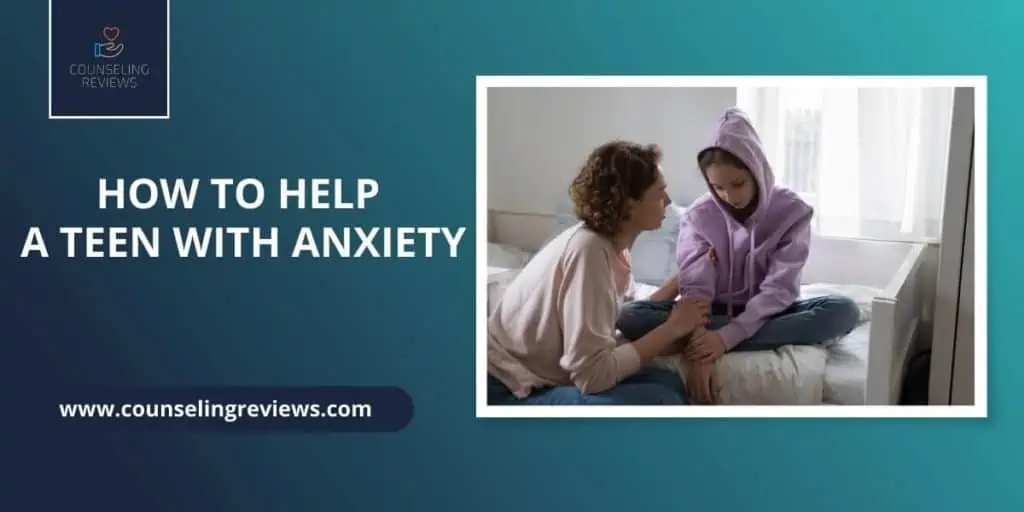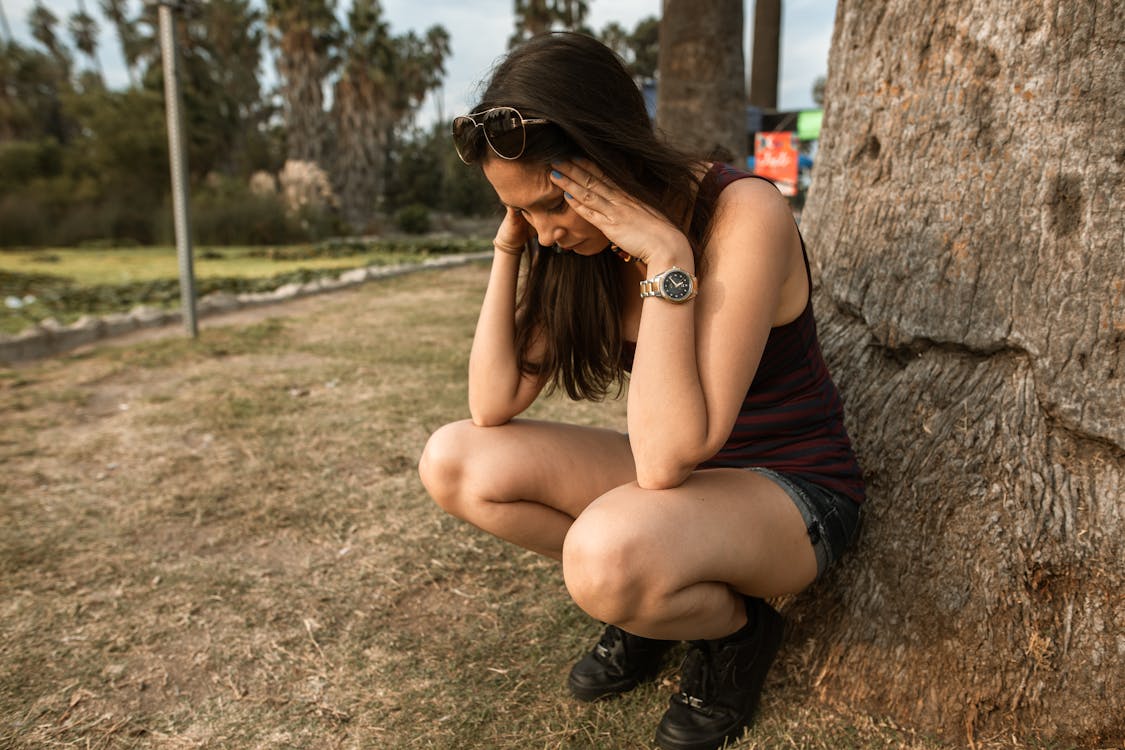Anxiety is a pretty common disorder nowadays that often goes untreated.
Any generation may experience feelings of anxiety—especially teenagers.
According to The National Institute of Mental Health, one out of three adolescents between 13 and 19 have a form of anxiety disorder.
Recognizing the symptoms characteristic of anxiety in your teen is crucial.
Once you notice the signs, you need to act promptly and help your child deal with their emotions in a way it is necessary.
Anxiety disorder belongs in the group of treatable conditions, and getting the appropriate therapy can minimize symptoms and help your teenager navigate teenage years and coming of age with ease.
To learn how to recognize the signs of anxiety and best support your teen, stay with us and keep reading!
What Causes Teenage Anxiety?
Teenagers can experience anxiety for a variety of reasons, often arising from a combination of environmental and biological factors. It’s important to note that anxiety tends to have a genetic component and may run in families, with a higher prevalence treating anxiety among girls compared to boys.
Anxiety disorders encompass a range of mental health issues, including generalized anxiety disorder (GAD), obsessive-compulsive disorder (OCD), panic disorder, post-traumatic stress disorder (PTSD), social anxiety disorder, and specific phobias. Additionally, some teens struggle and grapple with separation anxiety, characterized by a fear of being away from home.
It’s not uncommon for adolescents to face multiple types of anxiety simultaneously, with three of the most prevalent being separation anxiety, social, anxiety and depression association, and generalized anxiety.
The onset of an anxiety disorder in teenagers is frequently triggered by stressful events or circumstances. These stressors can include sudden life changes, academic challenges, excessive responsibilities that surpass their level of maturity, family-related stress, or traumatic experiences like bullying or various forms of abuse.
Parents also play a significant role in their teen’s anxiety. If parents themselves struggle with anxiety or are excessively protective, it can contribute to their child’s anxiety levels. Research from 2021 underscores the vital role of parental support in adolescent mental health. By encouraging adolescents to develop effective coping strategies to overcome teen anxiety, such as acceptance, distraction, and fostering a positive mindset, parents can help bolster their own body and well-being and alleviate stress and anxiety.
Why is Teenage Anxiety on the Rise?
Teenage anxiety appears to be on the rise due to a complex interplay of various factors. The modern digital age brings increased exposure to social media, cyberbullying, and the pressure to maintain a curated online persona. Academic demands and competition for college admissions contribute to academic stress. Moreover, societal expectations, economic uncertainties, and family dynamics can exacerbate anxiety.
The COVID-19 pandemic has further intensified these stressors, with disrupted routines, social isolation, and health concerns. It’s crucial to address this rising trend through better mental health education, early intervention, and fostering supportive environments to help teenagers cope with the challenges they face.
The Good Aspects of Anxiety
While anxiety is often seen as a negative emotion, it does have some beneficial aspects. Anxiety can serve as a natural alarm system, alerting us to potential threats and dangers. This heightened awareness can lead to better decision-making and increased vigilance in certain situations. Anxiety can also motivate individuals to prepare and plan for the future, improving their overall readiness for challenges.
In moderate amounts, anxiety can boost performance by enhancing focus and concentration. It can be a powerful driving force for personal growth, pushing individuals to step out of their comfort zones and face new experiences. Thus, anxiety, when managed appropriately, can have constructive effects on our lives.
Signs of Anxiety in Teenagers
During teenagehood, the body undergoes hormonal changes, and the education process itself can put an additional strain on your teenager, leading to mental health problems—anxiety included.
If not treated, anxiety can become potent enough to drain teens’ energy and even negatively impact their social life.
During the teenage period, both girls and boys are more sensitive and often seek validation from their peers or ask themselves what the people around them think of them.
These questions often stop teens from talking about mental health and, more importantly, stop them from seeking advice and solutions for their troubles.
Sometimes, it can help to put ourselves in their shoes and observe the possible signs resulting from anxiousness.
Additionally, this will benefit you in providing the proper support for your teenager to brave through the difficult period they face.
Symptoms and signs typical of anxiety disorder in a teen include:
Lack of interest in activities they used to prioritize;
Low mood that usually lasts for more than a few weeks;
Academic performance that radically dropped for no reason;
Constant feelings of tiredness;
Problems with concentrating at school and home;
Inability to relax and let go;
Reduced communication with family and friends.
Anxiety also causes physical signs that require just as much of your attention. Physical symptoms and representations of anxiousness include:
Rapid breathing;
Increased heart rate;
Insomnia;
Nightmares or bed-wetting
How to Help Your Teenager if They Have Anxiety
We went over the top signs hinting at anxiety. Now, it’s time to explore the best ways to help your child navigate them:
1. Talk to Your Teen About their Thoughts and Feelings
When your teen starts opening up to you and reveals their plans, school achievements, daily tasks, or relationships with their friends and classmates, do your best to find out how they see things and feel about them.
Anxiety works the same for most adolescents, and you must learn how to read the conversation with your teens properly.
Pay special attention when they talk about the things and events they have going on, as such information can give you insight into how they feel and face their daily struggles.
Discussion can also say a lot about teens’ relationships with teachers and how they envision themselves.
2. Instead of Punishing Them, Give Them Space
If you notice that your son or daughter-teenager behaves poorly at school or you find out they hid something huge from you, you should stay calm so as not to trigger their anxiety further.
Remember that punishing your teen or fiercely responding can make things worse.
Instead, your teenager may become more introverted and start concealing their feelings.
You won’t benefit from that as well, as you won’t be able to find the root of their mental health problems and the key to solving the complication in the long term.
Respond kindly to make your teen feel comfortable talking to you and give them space to think about their concerns.
That can help you stay watchful of all the changes related to your child’s personality or eating and sleeping patterns, successfully avoiding sabotaging your relationship and the fight against your own anxiety too.
3. Encourage Teens to Take Good Care of Their Physical Health
Mental and physical health go hand in hand, and in case an adolescent doesn’t get enough sleep, nutrients, and physical activity, their anxiety symptoms may quickly escalate.
Implementing a healthy lifestyle can improve teenagers’ mental health problems, such as anxiety.
The human brain releases endorphins during physical activities, also known as the ‘happy’ hormone, to trigger positive feelings and reduce anxiousness.
Professionals recommend at least 30 minutes of physical activity per day, encouraging teens to join a sports team or group to boost their social life.
Here are some additional tips for helping a teen with anxiety
-
Talk to Your Teen About Anxiety:
-
Explain to your teen that anxiety can serve as a protective emotion, making them aware of potential dangers and helping to keep them safe. Let them know that feeling anxious can have a positive purpose.
-
Foster open communication with your teen, even when it’s challenging. Maintain trust and comfort so they feel they can share their feelings with you.
-
Regularly inquire about their day, offer words of encouragement, and validate their feelings, especially when they express worry or anxiety about a situation.
-
-
Use Active Listening Skills:
-
Teens seek supportive connections and a way to vent their feelings. Practice active listening by giving your teen your full attention, making eye contact, and nodding to show you’re engaged.
-
Avoid interrupting your teen while they’re speaking, allowing them to express themselves fully.
-
-
Prepare for Difficult Situations:
-
Discuss both rational and irrational responses to the challenges your teen faces, whether related to school, social relationships, or general life concerns.
-
Acknowledge that certain situations can be anxiety-provoking but help your teen put them into proper perspective.
-
Offer alternative, more effective ways to handle challenging situations, helping them reframe irrational thoughts.
-
-
Build Your Teen’s Self-Esteem:
-
Emphasize your teen’s strengths rather than dwelling on their weaknesses. Compliment them on positive attributes like thoughtfulness, kindness, or unique character traits.
-
Recognize and celebrate their individuality and accomplishments. Encourage them to take pride in their abilities and efforts rather than obsessing over outcomes.
-
If your teen has specific interests or talents, such as art, music, or athletics, use these as sources of motivation and self-esteem. Praise their dedication and hard work in these areas.
-
-
Set Realistic Expectations:
-
Be mindful of the expectations you set for your teen. High expectations and excessive pressure can contribute to anxiety. Encourage realistic goals that guide them toward academic improvement without overwhelming them.
-
-
Encourage Helping Others:
-
Involvement in activities that benefit others can boost your teen’s self-esteem and provide a healthy distraction from anxiety.
-
Suggest volunteer opportunities in the community or join clubs or groups that align with their interests. These activities can improve social skills and foster a sense of belonging.
-
When to Seek Professional Assistance
If you observe that your child or teenager’s anxiety is not showing significant improvement, it’s advisable to consider seeking additional support from a professional counselor or therapist.
Cognitive behavioral therapy (CBT) is typically the recommended approach for addressing anxiety in children and teens with anxiety. CBT is behavior therapy that is designed to reshape the way your child thinks, which in turn can lead to positive changes in their behaviors and emotional responses. The effectiveness of this treatment is maximized when you find a therapist who is the best fit for your child.
CBT can involve parents in the process, especially when working with younger children. In these cases, the focus often centers on addressing the behavioral aspects of anxiety. The skills acquired through therapy can serve as valuable coping mechanisms that children and teenagers can utilize throughout their adult lives.
In some instances, medication may be prescribed to treat anxiety in children. Serotonin reuptake inhibitors (SSRIs), a type of antidepressant, are commonly prescribed for this purpose. Anti-anxiety medications may also be considered for children and teens struggling with severe anxiety that significantly disrupts their daily functioning.
Even when medication is deemed necessary, it is often recommended that children and teens simultaneously engage in CBT to develop coping skills, ensuring a comprehensive and long-term solution to their anxiety-related challenges.
Conclusion
Anxiety is a modern disorder that can strike anyone, no matter their age or socioeconomic status
Parents and teachers must be very cautious to recognize the anxiety symptoms in teenagers on time to intervene immediately and help them resolve their problems with ease.
After all, good mental health is the most important life skill and key to a joyful teen!






